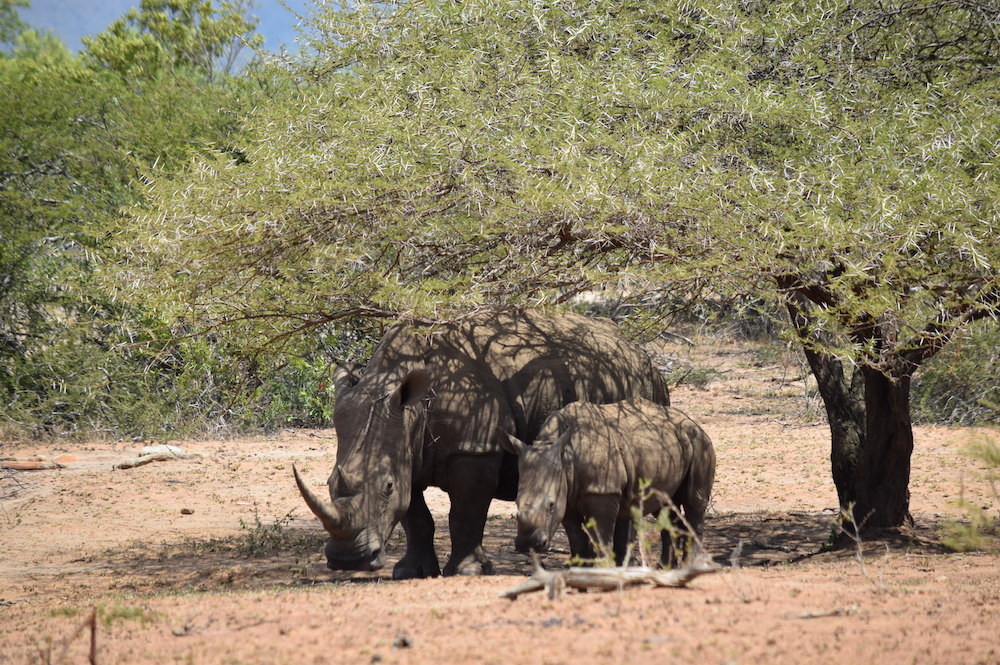Facing the fears and horrors of tackling wildlife poaching on a daily basis can feel overwhelming. Add to this the impact of the Covid-19 pandemic, and life in 2020 for South Africa’s rangers has been extremely tough. These brave men and women have often had to cope with insufficient funding for effective equipment, deal with the constant worry about the health and safety of loved ones, and work longer hours to make sure that rhinos and other threatened wildlife remain safe. Protecting rhinos during the pandemic has been hard.
Before Covid-19 hit last year, rangers at Hluhluwe-iMfolozi Park (HiP), in KwaZulu Natal, South Africa, had already been working longer shifts, due to a period of intense poaching. When strict lockdown rules started, there was no time to rest. The uncertainty of the pandemic meant that their workload increased; team members who were already on leave couldn’t come back to work and the extra eyes and ears of tourists suddenly disappeared. The poaching threat was even greater than before.
It became essential for teams to complete longer patrols. Rangers walked for hours each day, constantly on the lookout for unusual activity, whilst carrying on their backs everything they needed for weeks in the field.
Thankfully, before the pandemic, your donations provided 130 self-sufficient camping kits for HiP’s rangers. This equipment has proved critical throughout 2020, allowing teams to remain as effective as possible, even when they had to be deployed at short notice. More recently, donations from our Covid-19 crisis appeal helped purchase extra personal protection equipment (face masks, gloves, and hand sanitiser) making sure that every ranger, their team, and their wider community could remain protected from the threat of Covid-19.
Mercifully, the initial strict lockdown protocols across South Africa that put an abrupt stop to tourism also seemed to suppress poaching: fewer incidents were recorded during those early weeks, most likely due to the huge reduction in travel. Without critical travel corridors within and outside of the country, it is much harder for criminals to transport a poached horn to consumers in countries like Vietnam or China.
Yet despite the let-up in poaching, rangers had to remain vigilant, patrolling day and night, staffing roadblocks and conducting random vehicle checks, as well as manning observation and listening posts in hotspot areas. This is the core, difficult work of rangers in the ongoing struggle against rhino poaching.
And then, as the first movement restrictions lifted in June-July, poaching across HiP intensified. Field rangers were still working long hours with fewer resources and in the face of all the limitations and constraints of the Covid-19 pandemic.
During times like these, it’s the little things that can really make a difference.
Thanks to our incredible donors across the world, we were able to give rangers at HiP some extra support. Your donations provided vital safe storage for food and equipment. You helped to pay for essential vehicle maintenance, purchasing new tyres for patrol vehicles, and repairing vital infrastructure. And you ensured that water connections could be fixed, improving boreholes and piping at a number of outposts, making sure that staff could continue to safeguard wildlife in remote locations across the Park.
Now, in 2021, the rangers of HiP are facing new challenges. A new variant of the novel coronavirus is spreading across South Africa, despite the summer weather, and the country is under an even stricter lockdown, including a curfew; schools, parks and even beaches are closed. And still, your support continues to make every day that little bit better for rangers in HiP and across Africa and Asia, so that they can continue doing everything possible to save the iconic animals that we all love.
Thank you so much to all our incredible donors and partners for supporting rangers at Hluhluwe-iMfolozi Park.









